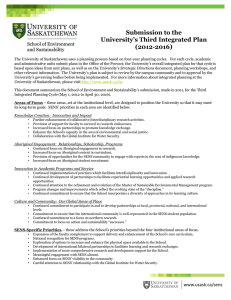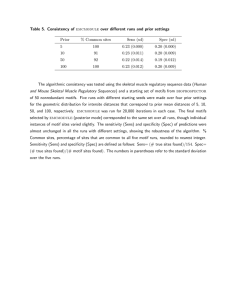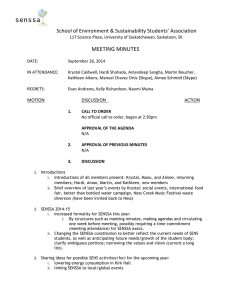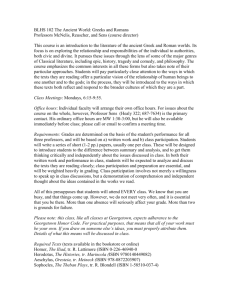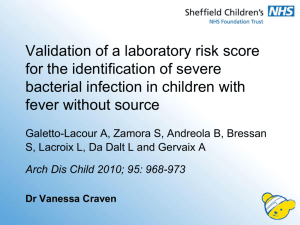TALKING E SENS
advertisement
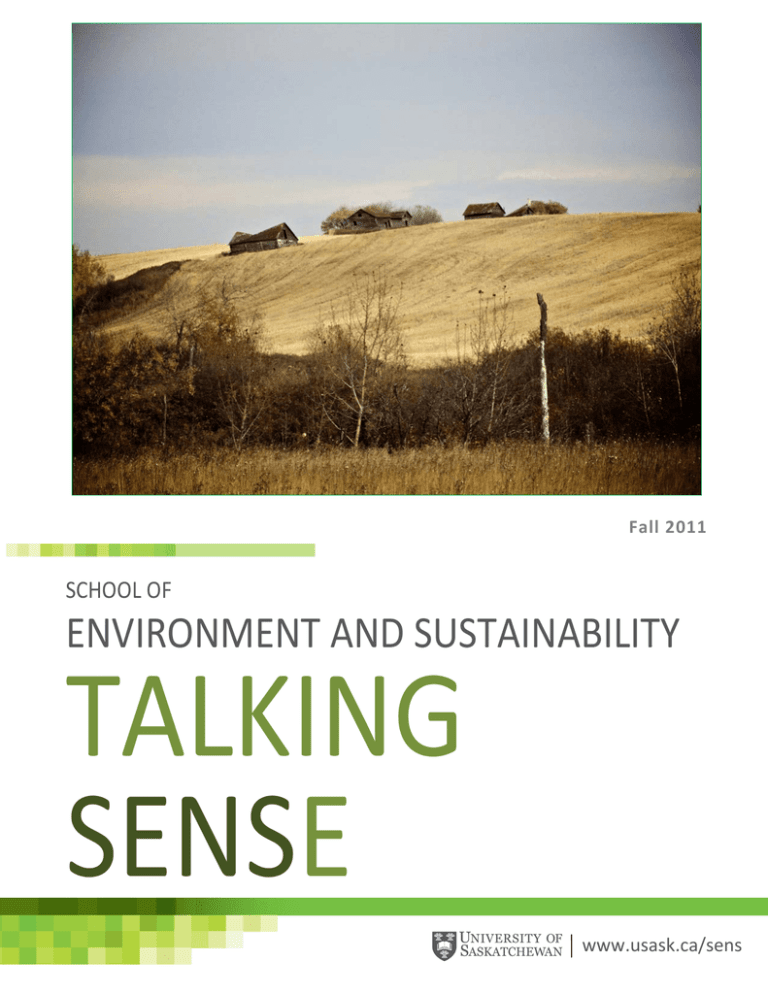
Fall 2011 SCHOOL OF ENVIRONMENT AND SUSTAINABILITY TALKING SENSE www.usask.ca/sens School of Environment and Sustainability University of Saskatchewan Kirk Hall, Room 323 117 Science Place Saskatoon, SK S7N 5C8 Executive Director Karsten Liber, PhD Assistant Director ‐ Academic Maureen Reed, PhD Newsletter Editors Meagan Hinther Communications Specialist Photo above: SENS students in ENVS 801: Ecosystem Science and Sustainability investigate an aquatic sample during their field trip to the Redberry Lake Biosphere Reserve in early October 2011. Photo courtesy Ranjan Datta, a student in the PhD program. Cover photo courtesy Vanessa Hickey. Vanessa is a student in the Master of Sustainable Environmental Management program. She took this photograph during the ENVS 801: Ecosystem Science and Sustainability field trip. CONTENTS 2 Sharla Daviduik, MRM, EPt Administrative Officer 3 Executive Director’s Message 4 Northern Elder‐in‐Residence Randall Tetlichi Visits SENS 5 SENS Profiles 6 Noteworthy Achievements 7 SENS’ New Canada Research Chair: Markus Hecker 8 Fall Convocation 8 Community Engagement: SENS Connect 9 Research at SENS: Youth Workshop About Pipeline Development 10 SENS Talking Points 10 Upcoming Events School of Environment and Sustainability | University of Saskatchewan | Fall 2011 EXECUTIVE DIRECTOR’S MESSAGE DR. KARSTEN LIBER Another fall has come and gone, and the faculty and students in SENS are nearing the end of yet another busy semester. As time goes by, SENS has continued to evolve as a School, with the overarching goals of providing high quality and innovative academic programming for our students, and a collaborative, interdisciplinary home for our faculty. Graduate student enrollment remains high at 61 and our faculty complement has grown to 19 professors comprising 11.4 FTE (many of the School’s faculty maintain joint appointments). Much of this growth has resulted from four new hires under the Canada Excellence Research Chair (CERC) program, one of whom started this fall and three of whom will start in the new year (a fifth professor started in early 2011). This growth, and the partnership with the CERC program, provides exciting opportunities for SENS as it prepares for the next four‐year planning cycle. In preparation for this new planning cycle (2012‐16), SENS completed and submitted its Integrated Plan to the Provost’s Office this fall. The plan documents many noteworthy accomplishments that occurred during the School’s first four years of existence, and presented a collection of ideas and priorities for the School as it moves into the next four‐year cycle. We are both excited and optimistic about this plan, and hope that it will receive the support needed to see the School continue its growth and development. The School is well on its way to becoming a leader in environment and sustainability education and research in Canada. As many of you already know, the end of this calendar year will mark the end of my term as Executive Director of SENS. My esteemed colleague, Professor Maureen Reed, will take over as Acting Director in January. I have thoroughly enjoyed the privilege of leading the School through its formative years and hope to see it grow to a whole new level in the years to come. I thank the students who have put their faith and their education in the “hands” of the School and its faculty, and I particularly thank the faculty and staff who have made the School the success it is today. I have learned a lot from all of you and hope to continue to do so in the years to come. It has been a pleasure serving you. Sincerely, Karsten Liber, PhD Executive Director A new face at SENS: The School of Environment and Sustainability is pleased to welcome Assistant Professor Helen Baulch to its faculty. Dr. Baulch is also affiliated with the Global Institute for Water Security. She is an aquatic ecosystem biogeochemist; her research concerns the effects of climate change on freshwater ecosystems. Before coming to the U of S, Dr. Baulch held an NSERC Postdoctoral Fellowship at the Centre for Limnology at the University of Wisconsin. School of Environment and Sustainability | University of Saskatchewan | Fall 2011 3 NORTHERN ELDER‐IN‐RESIDENCE RANDALL TETLICHI VISITS SENS Given the importance of Aboriginal concerns in the context of resource management, the School of Environment and Sustainability was fortunate to host Northern Elder‐in‐Residence Randall Tetlichi from October 21 to November 12, 2011. Mr. Tetlichi is a member of the Vuntut Gwitch’in First Nation and is from Old Crow, Yukon. He works at Yukon College in Whitehorse, where he provides support for First Nations students. The visit was organized by Dr. MJ Barrett, whose own research includes a focus on Aboriginal perspectives and inclusion of indigenous knowledges in environmental decision‐making. During his time at the U of S, Mr. Tetlichi gave seminars in several venues, including the Western College of Veterinary Medicine, the Lutheran Seminary, and SENS. These lectures provided insights about human‐animal relations from an Aboriginal perspective, Aboriginal spirituality, and traditional knowledge and the environment. He also visited many classes, in SENS, the College of Education, and the International Centre for Northern Governance and Development. “He taught us that learning is holistic and knowledge comes from relationships, spirituality, care, and respect,” says Ranjan Datta, a SENS PhD student, reflecting on the visit. “Sustainability is nothing but respect for the natural law of caring for ‘everything.’” Maya Basdeo, an MES student, says, “I appreciated Randall's frankness with people. He made himself available to anyone who had questions, and answered those questions in a kind, yet straightforward, manner. He was asked all manner of questions, and some of them seemed rather complicated. I was struck by the number of times he answered a question with the statement, ‘Well ... it starts with you.’ It seems like a simple answer, but once you start thinking about it you see how challenging that simple thing can be, because it means we each have to pay attention to the way we each think, hear, listen, and talk. Much easier said than done.” The success of Mr. Tetlichi’s visit and the high level of engagement with students will likely lead to SENS hosting other residencies in the future, giving members of the SENS community the chance to interact with experts over a prolonged period of time. Top photo, from left: SENS Assistant Professor MJ Barrett, Executive Director Karsten Liber, Northern Elder‐in‐Residence Randall Tetlichi, and Assistant Director – Academic Maureen Reed. Drs. Liber, Reed, and Barrett welcomed Mr. Tetlichi to SENS with traditional gifts of tobacco and white and blue cloth. Bottom photo: Mr. Tetlichi speaks at ENVS 990: Seminar in Environment and Sustainability on November 4. Photo courtesy Ranjan Datta. 4 School of Environment and Sustainability | University of Saskatchewan | Fall 2011 SENS PROFILES: FACULTY DR. BRAM NOBLE Bram supervised Poornima Sheelanere, the first student to ever complete a Master of Environment and Sustainability degree at SENS. SENS affiliation: Professor, jointly appointed in the Department of Geography & Planning and SENS. Research interests: Environmental impact assessment; resource development; environmental planning and management; multi‐ criteria decision analysis. Favourite music: Classic rock of the mid‐60s to mid‐70s; Zeppelin, The Doors, The Guess Who. Ehimai is conducting research about the impact of tar sand industries on the aquatic environments of Athabasca and Slave Lakes. SENS affiliation: PhD student. Place of birth: Edo State, Nigeria. Most significant achievement: Am not there yet but I am thankful to God for every stage of my life. Favourite music: I like most popular genres, from inspirational to rock. When I want to stir up my political consciousness, I listen to Bob Marley and Wyclef Jean; for reflection, it’s Coldplay or general Christian music. When I need to rock things up, it’s George Thorogood. My favourites are: Whitney Houston, Norah Jones, Diana Krall, Alexi Murdoch, John Mayer, David Gray, Asa, The Band Perry and others. How do you define sustainability? The ability of an ecosystem to function and maintain some desired level of productivity. Influences: My father. He’s always reminded me that a career is not what defines a person. Place of birth: Baie Verte ‐ a small mining town on the French Shore of coastal Newfoundland. What impact do you h hope tthat yyour research will have? Influence the policy and practice of environmental assessment, particularly how we assess, plan for, manage and communicate the potential impacts of resource development activities. Most ssignificant a achievement: I recently installed a new kitchen sink, but I’m not sure that counts. So, I’d have to say my two kids. SENS PROFILES: STUDENTS EHIMAI OHIOZEBAU Influences: I mainly get inspiration from studying the biographies of people who changed their world – Dr. Martin Luther King, Jr., Isaac Newton, Albert Einstein, Steve Jobs, etc. What impact do you hope that your research will have? The knowledge gap around the bioavailability and toxicity of parent, alkylated and metabolized PAHs in tar sands‐affected aquatic ecosystems will be addressed, as will the knowledge gap about extraction methods for removing contaminants from various biological substrates. This study may influence policy on regulation of pollutants emitted by tar sands industries, by providing the public and government with credible data on the nature and extent of chemical contamination from tar sand operations. How do you define ssustainability? From my ecotoxicological point of view, I define sustainability as going beneath the set thresholds of contaminant burdens in ecosystems. Thresholds are set by regulators (for example, the EPA) through toxicity tests, risk assessments, etc. I consider industrial and domestic players who go the extra mile in setting internal reduction policies to be sustainable. I would prefer to define sustainability as a contaminant‐free environment, but there is no such thing! Contaminants are ubiquitous. Consequently, we will only become sustainable when we reduce (or, more ambitiously, stop) new emissions and mitigate already‐ released contamination. School of Environment and Sustainability | University of Saskatchewan | Fall 2011 5 SENS PROFILES: ALUMNI MICHEL LAVALLEE CLASS OF 2010 Michel graduated from SENS with his Master of Sustainable Environmental Management degree in October 2010. His ENVS 992 project was entitled “Wildlife Harvest Data Collection and Management by Yukon First Nations: Lessons Learned and Future Steps.” Michel Lavallée has been busy since graduating from SENS in 2010. As a Junior‐Intermediate Wildlife/Fisheries Biologist with SHARP Environmental in Fort St. John, BC, his main responsibility is to conduct pre‐construction site assessments in the oil and gas industry, often working 60+ hours a week. “I dig a lot of soil pits, often 100 soil pits per day,” says Michel. “The objective of these soil surveys is to guide construction practices in how much soil to salvage and stock‐pile for reclamation when the work is done. These assessments often include an overview of vegetation and wildlife present in the area and an examination of any potential impacts the development may have on local populations.” NOTEWORTHY ACHIEVEMENTS Al Scholz wins international agriculture journalism award SENS congratulates MSEM student Al Scholz, recipient of the International Federation of Agriculture Journalists (IFAJ) Award for Reporting on Sustainable World Agriculture. Al’s story, ‘Food Scarcity – A Myth?’, described the complexities surrounding sustainability and food, and commented that a multi‐faceted approach is needed to address this complex issue. The article appeared in the Spring 2011 edition of Sustainable Futures magazine, published by the Agriculture Institute of Canada. The awards were announced at the 2011 IFAJ congress awards banquet in Niagara Falls, Ontario on September 17. The competition drew 23 entries from eight countries. 6 Arcadio Viveros‐Guzman recognized with top prize for research poster SENS PhD student Arcadio Viveros‐ Guzman won the top prize at the Student Poster Competition of the 10th Conference of the Canadian Rural Health Research Society in Vancouver, October 20 ‐ 22, 2011. His poster, entitled Socio‐ environmental Dimensions of Safety of Mexican Seasonal Farmworkers in Saskatchewan: Opportunities for Learning Sustainability, was judged by a panel based on quality, evidence, illustrations and overall appearance. In addition, the poster was awarded the Peoples' Choice Award for Best Poster. 'I associated the research process with a mechanism," said Arcadio when asked why he chose to represent his research the way he did, "then I thought that mechanisms need power to trigger movement. The power is represented by the rationale (major force), purpose and research questions." School of Environment and Sustainability | University of Saskatchewan | Fall 2011 Speaking to the challenges that environmental professionals face, Michel points out that sustainability is a term that does not appear to have a clear definition or a set of standards for determining if a particular practice is sustainable. “Sustainability is often measured in revenue, and multi‐generational sustainability does not fit into a fiscal quarter. This may be the greatest challenge for us, changing the accounting system to include benefits that cannot be measured by the dollar.” Above: Arcadio Viveros‐Guzman and his award‐ winning poster. Right: MSEM student Al Scholz. SENS’ NEW CANADA RESEARCH CHAIR: MARKUS HECKER SENS Canada Research Chair and Associate Professor Markus Hecker (right) chatting with David Vardy and Jonathon Doering, graduate students in the Toxicology program. Water and the creatures that live in it have always fascinated SENS associate professor Markus Hecker. As a boy growing up on the banks of the River Rhine in a heavily industrialized area of Germany, he witnessed the impact that pollution can have on water bodies. These experiences, combined with his passion for aquatic life, inspired him to pursue a career in ecotoxicology and to study the effects of toxic chemicals on biological organisms. This passion has led to significant accomplishments for Hecker, and on October 12, 2011, he was awarded a Tier 2 Canada Research Chair (CRC) in Predictive Aquatic Ecotoxicology by the Canada Research Chairs Program, receiving a total of $500,000 over a five‐ year period. The Canada Research Chair program was established in 2000 by the Government of Canada in order to attract and retain top researchers from around the world. Funds from the program are used towards the Chairholder’s salary and to run the associated research program. The mission of Markus’ program is to shed light on environmental issues created when aquatic life is exposed to industrial chemicals and other stressors such as climate change. His research seeks to develop novel and objective approaches and problem‐solving strategies to provide the scientific community, governments, and industry with solutions to aid in the sustainable management of our environment and its resources. Markus combines advanced molecular biology techniques with traditional ecotoxicology tools to create novel approaches and strategies to predict the effects of contaminants earlier and with greater precision. He focuses on indicator species – in this case, ecologically important native fish like sturgeon and northern pike – whose health reflects that of the ecosystems in which they live. While there is a wealth of information on how contaminants affect common laboratory animals, little is known about how they can impact key biological functions of indicator species native to Canadian watersheds, or even how vulnerable these species are to such contamination. Markus’ research promises to reduce uncertainties associated with current approaches in environmental risk assessment and provide critical information to help protect our vital water resources and aquatic environments. “The first step in my research is to characterize the basic biological and physiological functions, and how they are regulated in aquatic species native to Canadian watersheds,” says Markus. “Once we better understand these functions in healthy fish, we can then use this as a basis for the assessment of environmental stressors under laboratory and field conditions. We aim to collect samples of fish in stressed environments – such as upstream and downstream of oil sands operations in Fort McMurray – and see how these species are responding to contaminants in their environment. ” How fish in the wild respond to environmental stressors will be validated using native species raised in Markus’ lab at the Aquatic Toxicology Facility at the Toxicology Centre. Ultimately, all information gathered will be used to develop models that realistically predict how native fish species respond to contaminants, and will reduce the need to use large numbers of wild animals for research and risk assessment studies. School of Environment and Sustainability | University of Saskatchewan | Fall 2011 7 FALL CONVOCATION Congratulations, SENS graduates! One Master of Environment and Sustainability degree and ten Master of Sustainable Environmental Management degrees were conferred at the University of Saskatchewan convocation ceremony held on October 22, 2011. Master of Environment and Sustainability: Jania Chilima. Thesis: Evaluating Institutional Arrangements to Support Watershed‐Scale Cumulative Effects Assessment in the Grand River Watershed, Canada. Master of Sustainable Environmental Management: Kingsley Ahey. Project: Evaluation of Cumulative Effects Assessment Practices for Petroleum and Natural Gas Well‐Site Developments in Southwestern Saskatchewan. Cynthia Avila. Project: Characterizing Patterns of Human‐Polar Bear Interaction in Wapusk National Park. Daniel Brent. Project: Congestion and Headache: Prescriptions for Gridlock. Charu Gupta. Project: From Seeds to Salads: Evaluating the Impact of Garden Based Learning Through Little Green Thumbs. Elisa Hsieh. Project: Shellfish Aquaculture in Baynes Sound: Capability, Issues and Strategies. Brittany Morgan. Project: Exploring Watershed Governance: Opportunities for the Saskatchewan River Basin. The School held its second SENS Connect event on October 14, 2011. The purpose of the event is multi‐ fold: it allows students to network with organizations involved in the local environment sector, it allows these organizations to learn about SENS, and it sets the stage for possible research collaborations between students and these organizations, especially for students in the Master of Sustainable Environmental Management 8 Sarah Turkeli. Project: Greenscapades Schoolyard Learning Program: The Future of Environmental Expertise and Local Food Sovereignty. Matthew Wolsfeld. Project: Valuing Urban Wetlands: A Municipal Policy Analysis. Stephanie Woods. Project: Human‐Polar Bear Interactions in Wapusk National Park and Greater Wapusk Ecosystem. Jesse Woodward. Project: Preventative Measures: To What Extent Was the Evolution of Environmental Thought in America a Sociocultural Expression of the Precautionary Principle? MSEM graduates celebrate their achievements at Convocation. Photo courtesy Charu Gupta. COMMUNITY ENGAGEMENT: SENS CONNECT Ten organizations were in attendance: City of Saskatoon – Environmental Services Branch Federated Co‐op Redberry Lake Biosphere Reserve Saskatchewan ECO Network Saskatchewan Environmental Industry and Managers Association Saskatchewan Environmental Society Saskatchewan Waste Reduction Council School of Environment and Sustainability | University of Saskatchewan | Fall 2011 Saskatoon Environmental Advisory Committee South Saskatchewan River Watershed Stewards University of Saskatchewan Office of Sustainability SENS thanks these organizations for their participation in SENS Connect and looks forward to future research collaborations! Participants at the Youth Workshop on Pipeline Development. Photo courtesy Alexis Harvey‐Schafer. RESEARCH AT SENS: YOUTH WORKSHOP ABOUT PIPELINE DEVELOPMENT By: Alexis Harvey‐Schafer Alexis was a Post Doctoral Fellow at SENS who worked in the Yukon on outreach activities related to a SSHRC‐funded public outreach grant entitled “Community Adaptation to Pipeline Development.” The grant was awarded to Clint Sawicki (Yukon College); Douglas Clark (now at SENS, previously at Yukon College); Ellen Bielawski, Marianne Douglas, and Mark Nuttall (University of Alberta); and Pearl Callaghan (Alaska Highway Aboriginal Pipeline Coalition). Alexis was supervised by Dr. Douglas Clark, Centennial Chair and Assistant Professor in the School of Environment and Sustainability. A youth workshop on community level impacts of pipeline development was held at Dä Kų, Yukon on March 30, 2011. Dä Kų is the Champagne and Aishihik First Nations Interim Cultural Centre, and is located in the town of Haines Junction. This workshop was well‐attended by youth from Champagne and Aishihik First Nations, as well as Kluane First Nation, with 18 participants taking part. This workshop was put on by Yukon College, in partnership with the Alaska Highway Aboriginal Pipeline Coalition (AHAPC). For over 30 years, the Alaska Highway natural gas pipeline has been a subject of potential development. It is important that youth are aware of the challenges and opportunities of pipeline development in their traditional territory. During this workshop, youth learned about the environmental, social, cultural, and economic benefits and impacts of pipeline development. Phil Bastien (AHAPC, Research and Communica‐ tions) presented background information about the pipeline project and the central role AHAPC plays in coordinating information and conducting research on the Alaska Highway gas pipeline project in the Yukon. Florian Lemphers (FSL Management Consulting) talked about the challenges and op‐ portunities faced by First Nations in negotiations with pipeline companies. Potential job opportunities created by pipeline development and the necessary training required to obtain these jobs was described by Chantal Rondeau (APAHC, Youth Outreach Coordinator). Ron Sumanik (Manager, Oil and Gas Development, Yukon Government) talked with the youth about technical aspects of the pipeline. The workshop wrapped up with my presentation about the potential social, economic, and cultural impacts of pipeline de‐ velopment, related through the story of the social‐economic impacts faced by the community of Fairbanks, Alaska during the construction of the Trans‐Alaska Oil Pipeline. The youth workshop on pipeline development was a big success, with the youth learning a lot about the challenges and opportunities of the potential pipeline development. I would like to extend a big thank you to all the youth that participated in the workshop. I would also like to thank Pearl Callaghan (AHAPC, Operations), Dixie Smeaton (Pipeline Liaison Officer for Champagne and Aishihik First Nations), Bradley Joe (Youth Councillor for Champagne and Aishihik First Nations) and Marissa Mills (Youth Councillor for Kluane First Nation) for their help with putting on this event. Funding for this workshop was provided by an outreach grant from the Government of Canada’s Social Science and Humanities Research Council, which was administered by Yukon College’s Northern Research Institute. School of Environment and Sustainability | University of Saskatchewan | Fall 2011 9 SENS TALKING POINTS Orientation – Making Sense of SENS: Incoming students learned more about SENS, its graduate programs, ethics approvals, and academic integrity at the annual orientation session on September 9, 2011. The entire SENS community enjoyed a welcome lunch beforehand – and had its photo taken! Alumni Newsletter: SENS Alumni now have a newsletter just for them. Called the Alumni Sensor, the newsletter is issued electronically three times a year and has useful information about upcoming professional development opportunities and alumni events. If you are a SENS graduate, but didn’t receive the September 2011 issue, please contact SENS. Forum for Leadership on Water: On October 7, over 125 people gathered at SENS to hear Robert Sandford, author and water policy advocate, discuss challenges and opportunities for water governance in Saskatchewan and Canada. The event, sponsored by the Global Institute for Water Security, was followed by a panel of U of S water experts: Howard Wheater, Patricia Gober and John Pomeroy. The visit was part of a national tour by the Forum for Leadership on Water ‐ a group of water experts from across Canada that encourages government action to protect fresh water resources. The SENS Community is Linked In!: SENS has created a profile and group on the professional networking site, LinkedIn. This provides a way for the SENS community, particularly students and alumni, to stay connected beyond their time at Kirk Hall. The group is updated regularly with sustainability events, job listings and other items of interest. Join today by searching LinkedIn.com for the School of Environment and Sustainability Community Group. Green Energy Park Signage Unveiled at Landfill: On November 24, Saskatoon Light & Power unveiled signage describing the many green energy projects under development at the Saskatoon Landfill. The signage content was researched and written by high school students in the Aden Bowman Collegiate Earthkeepers Program with help from SENS graduate students. The project has been recognized by the UN University – Regional Centre of Expertise on Education for Sustainable Development for promoting innovative research and activities. Everybody smile! SENS students, faculty and staff pose for a group photo outside Kirk Hall on September 9, 2011. UPCOMING EVENTS • • 10 December 9, 2011 – ENVS 803: Research in Environment and Sustainability Poster Presentations, 9:30 am – 2:15 pm, Education Building, Student Lounge March 9, 2011 – Master of Sustainable Environmental Management Poster Symposium, 2:00 pm, Room 144, Kirk Hall • March 22 – 23, 2012 – John Robinson Visit. Dr. Robinson is Executive Director of the University of British Columbia Sustainability Initiative. Read more about the initiative at www.sustain.ubc.ca School of Environment and Sustainability | University of Saskatchewan | Fall 2011
